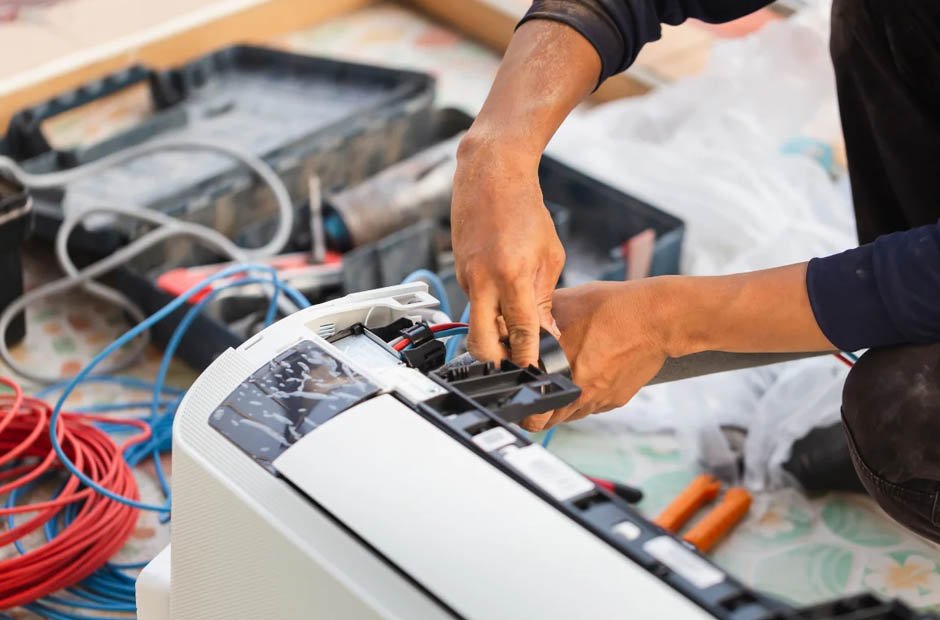Your HVAC system is crucial for maintaining your home’s climate and requires regular maintenance for optimal performance. This guide provides essential tips for homeowners and property managers to keep their systems running efficiently, avoid costly repairs, extend lifespan, and save on energy bills.
Signs Your HVAC System Needs Attention
Recognizing the early signs of HVAC issues can save you from expensive repairs down the line. Here are some common indicators that your system may need some TLC.
Unusual Noises
If you hear grinding, squealing, or banging noises coming from your HVAC system, it could be a sign of mechanical issues. These sounds may indicate problems with the motor, fan, or other components.
Inconsistent Temperatures
Are some rooms in your home too hot while others are too cold? Uneven temperatures can be a sign that your HVAC system is struggling to distribute air properly. This could be due to blocked vents, leaky ducts, or an inefficient system.
Increased Energy Bills
A sudden spike in your energy bills without a corresponding increase in usage is a red flag. It often means your HVAC system is working harder than it should be, either because of inefficiency or underlying problems.
DIY Maintenance Tips
Regular maintenance can go a long way in keeping your HVAC system running smoothly. Here are some simple tasks you can perform yourself.
Change the Air Filters
One of the easiest and most effective ways to maintain your HVAC system is by changing the air filters regularly. Dirty filters restrict airflow, making your system work harder and less efficiently. Aim to change them every 1-3 months.
Clean the Vents
Dust and debris can accumulate in your vents, reducing airflow and efficiency. Use a vacuum cleaner with a brush attachment to clean the vents and return air grilles. This simple task can improve air quality and system performance.
Inspect the Thermostat
Ensure your thermostat is working correctly and set to the desired temperature. If it’s not functioning properly, it can cause your system to run unnecessarily, wasting energy and increasing wear and tear.
Scheduling Professional Maintenance
While DIY maintenance is essential, professional service is equally important for the longevity and efficiency of your HVAC system. Here’s what you can expect from a professional maintenance visit.
Comprehensive System Check
A professional technician will perform a thorough inspection of your HVAC system, checking for any signs of wear and tear, leaks, or potential issues. This comprehensive check helps catch problems early before they become major repairs.
Cleaning and Lubrication
Professionals will clean and lubricate critical components, such as the motor, fan blades, and coils. Clean components operate more efficiently, reducing strain on the system and lowering energy costs.
Performance Testing
Technicians will test the performance of your HVAC system to ensure it’s operating at peak efficiency. They may measure airflow, check refrigerant levels, and test the thermostat’s accuracy to ensure everything is working correctly.
Upgrading Your HVAC System
Sometimes, maintaining your HVAC system isn’t enough, and it’s time for an upgrade. Here’s when you should consider it and what options are available.
Age of the System
Most HVAC systems have a lifespan of 15-20 years. If your system is approaching or has surpassed this age, it may be time to consider an upgrade. Older systems are less efficient and more prone to breakdowns.
Frequent Repairs
If you find yourself frequently calling for repairs, such as air conditioning repairs like those available in Tempe, it might be more cost-effective in the long run to invest in a new system. The money spent on constant repairs could go towards a more reliable and efficient system.
Energy-Efficient Options
Modern HVAC systems offer a range of energy-efficient options that can save you money in the long run. Look for systems with high SEER (Seasonal Energy Efficiency Ratio) ratings, programmable thermostats, and environmentally friendly refrigerants.
Conclusion
Maintaining your HVAC system is crucial for comfort, efficiency, and cost savings. Regular DIY maintenance combined with professional check-ups can extend the life of your system and keep it running smoothly. If your system is old or requires frequent repairs, consider upgrading to a more energy-efficient model.
















